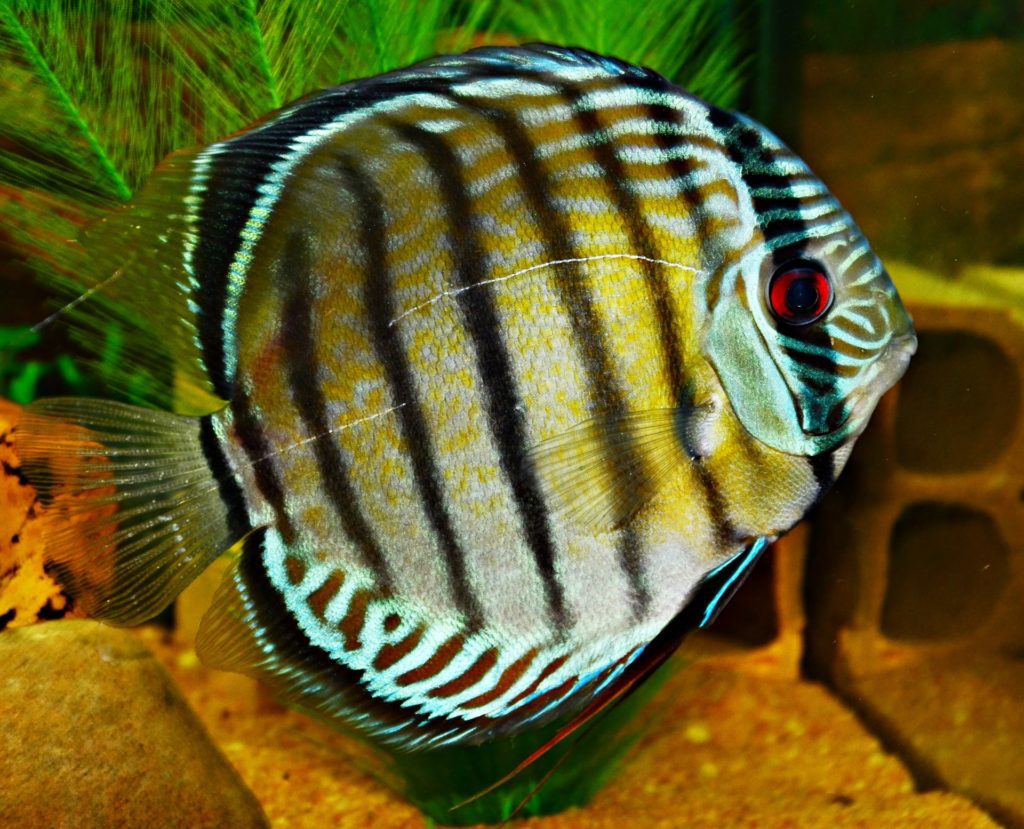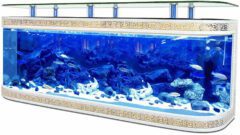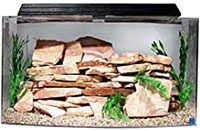South American discus fish are a colorful and fascinating addition to an aquarium, but do they thrive well in a community tank? Their distinctive coloring and shape make these fish a unique feature in freshwater aquariums. Discus fish—also called pompadour fish—have inherent characteristics that contribute to their compatibility with other fish as well as traits that are exhibited when under stress. In ideal conditions, you can expect a discus to live for ten years or longer when in captivity. However, it is critical that you provide the right conditions, water quality and tankmates for your discus fish to thrive.
Discus fish are an easy species to maintain, perfect for beginner aquarists and beautiful to behold. Even just one discus fish provides a colorful feature in a tank, but a habitat with several discus is really something to see!
Here is what aquarists should know about keeping discus fish in a community tank.
What Are Discus Fish?
Discus fish are three species of freshwater cichlids native to South America—Brazil, Colombia and Peru—and the Amazon River Basin, specifically. The discus fish prefer calm, warm waters and tend to congregate in shallower depths. Discus have short bodies and typically grow up to an average of ten inches in their natural habitat. There are a variety of colors found among discus fish, from brown to red. Discus fish in captivity tend to exhibit more colors—red, yellow, orange—than those found in the wild.
Their colors and demeanor make discus fish a great addition to any freshwater aquarium, even the novice. They are entertaining to watch, beautiful to observe and easy to care for.
How Many Discus Can Be Kept Together?
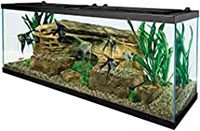 Discus fish are the perfect option for a freshwater aquarium, and when you keep a community of discus in one tank, it is spectacular to see! Discus are among the most colorful freshwater fish found globally and they are also easy to maintain under the right tank conditions. Sure, you can simply add one discus to your home tank, but remember, fish can become lonely all by themselves, which may impede their ability to thrive.
Discus fish are the perfect option for a freshwater aquarium, and when you keep a community of discus in one tank, it is spectacular to see! Discus are among the most colorful freshwater fish found globally and they are also easy to maintain under the right tank conditions. Sure, you can simply add one discus to your home tank, but remember, fish can become lonely all by themselves, which may impede their ability to thrive.
While discus cichlids don’t like to be alone, don’t forget that each fish needs at least ten gallons of water to survive. Therefore, a pair of adult discus fish need, at minimum, a 20-gallon tank. A pair of young discus fish can thrive in a 15-gallon tank, but they will outgrow it as they mature. In a community tank, we suggest at least a 55-gallon aquarium ideally or go even larger with a 100-gallon fish tank.
Can I Keep One Discus Fish?
A single discus fish can become bored quickly. They swim about slowly and prefer to move in schools with other fish. If you do get a solo discus fish, make sure that you keep it in a tank that is at least ten gallons or larger. If a single discus fish is kept alone in its tank, it may become lonely and hide. Discus feel isolated when they have no tankmates, but make sure to pair them carefully. Species that are food-aggressive can bully and cause the discus stress. Some fish that are under duress will start hiding from view, which may impact its ability to grow and prosper in the habitat.
Can You Keep Discus Fish in a Community Tank?
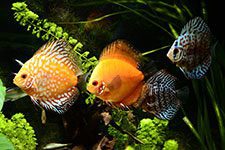
Yes, discus fish thrive in a community tank with other freshwater species. The best partners for discus fish in an aquarium are calm, schooling fish, including species from the characin fish family. This makes it easier to set up a habitat and environment that is compatible and healthy for both species. When discus fish feel bullied by more aggressive species, they tend to hide from them. The aquarist should take notice when their discus hides from view and recognize that it is a sign that something is off in the habitat.
Some aggressive species to avoid pairing with your discus include rainbow sharks and blue gourami. When your discus fish hides, it may be a sign that it is stressed-out by the other species in the tank.
What Fish Can Be Kept With Discus?
So, this begs the question, what fish can be kept with discus? If the conditions in the tank are right, aquarists can keep a wide range of species with discus fish. For instance, rosy tetras are easy to care for and docile in nature, much like the discus. Since they are both laid-back species, there is little incidence of aggression over food or space, making a peaceful community aquarium. Both species thrive in freshwater tanks and require similar care.
Another species that makes a compatible tankmate for discus fish are angelfish, though they require a bit of special care to cohabitate harmoniously.
Can Angelfish Live With Discus?
Angelfish and discus fish can live together in harmony if aquarists follow a few basic rules. Since discus fish thrive in freshwater tanks, you need to choose an angelfish that also thrives in freshwater. This is not the pairing for a saltwater aquarium, so make sure you can distinguish the difference when stocking your tanks.
Also, angelfish can become bossy and a bit aggressive over food around other fish; make sure to allow each fish ample room to get along and have their own space. This may also help prevent angelfish from stealing and eating the discus fish’s food at mealtime. If your discus feels threatened by the angelfish, they may hide and become isolated. When pairing discus and angelfish, keep the water around 80 degrees Fahrenheit, ideally, and at a pH of around 6.5. This creates the perfect habitat for both species.
Discus fish add visual appeal to your tank, but make sure to get them a mate or integrate fish into community tanks to prevent loneliness or boredom. Use these tips for setting up a community tank that includes discus fish, will bring something fresh, bold and different to an aquarium. Pair thoughtfully with species that won’t stress the discus and enjoy the vibrant colors and unique features of this wonderful, freshwater species.

